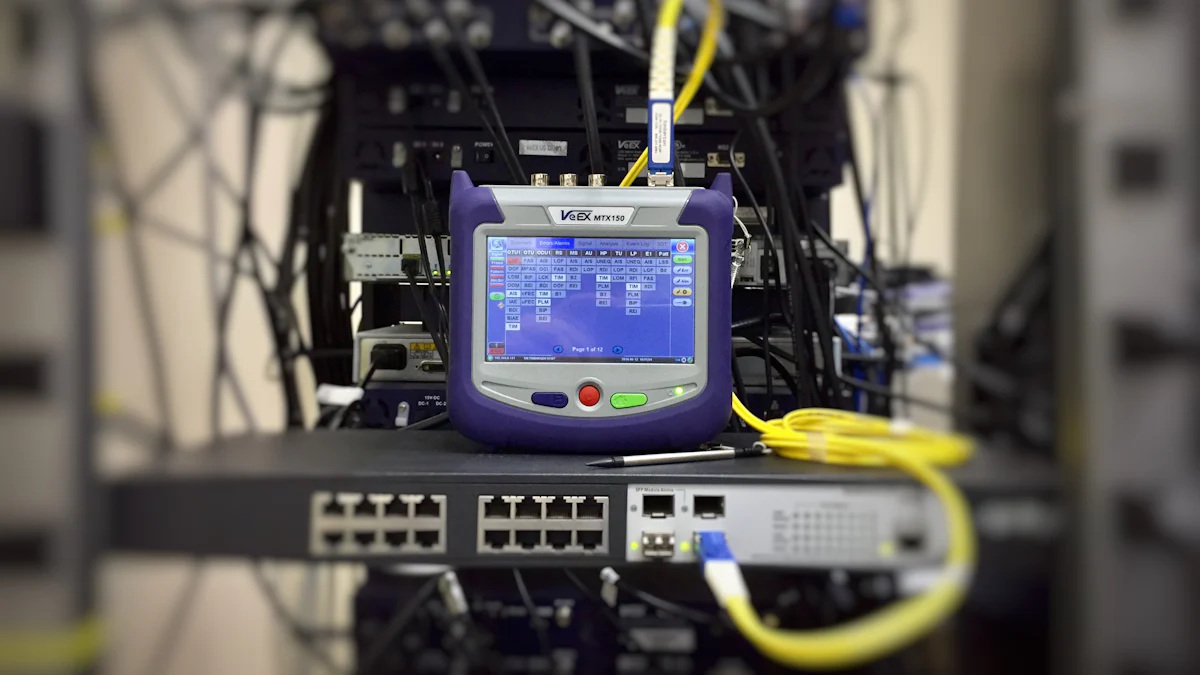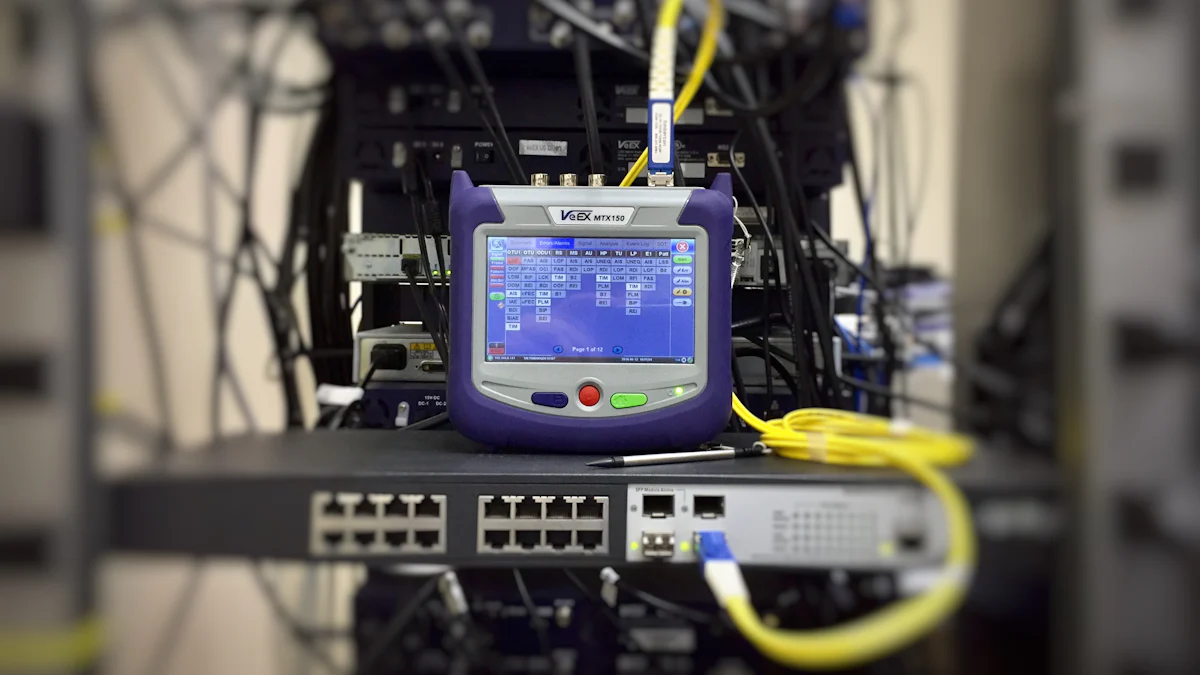How Frequency Converters Enhance Industrial Processes

A frequency converter transforms electrical currents to match different frequencies. Industrial settings rely on these devices for efficient power management. Modern industries demand energy-efficient systems and advanced automation. Technological advancements in frequency conversion technology drive growth. Industries like manufacturing, oil and gas, and aerospace benefit from these innovations. Europe shows significant growth due to strict energy regulations. Frequency converters play a crucial role in optimizing industrial processes.
Understanding Frequency Converters
Basic Concepts
Definition and Functionality
A frequency converter is an electronic device that changes the frequency of electrical power. This change allows equipment to operate efficiently under different power supply standards. Frequency converters play a vital role in industries like manufacturing, oil and gas, aerospace, and renewable energy. These devices ensure that machinery functions optimally by matching the power frequency to specific equipment needs.
Types of Frequency Converters
Frequency converters come in various types, each designed for specific applications. Rotary frequency converters transform input AC power into rotary mechanical power. This power then generates AC power at a different frequency. Static frequency converters use electronic components to achieve the same result without moving parts. Safety frequency converters control motor speed while ensuring high safety levels. These converters cater to diverse industrial requirements, providing flexibility and efficiency.
Key Components
Inverters
Inverters form a crucial part of frequency converters. These components convert direct current (DC) back into alternating current (AC) at the desired frequency. Inverters enable precise control over motor speed, which enhances process efficiency. By adjusting the output frequency, inverters help reduce energy consumption and operational costs.
Rectifiers
Rectifiers are essential in the initial stage of frequency conversion. These components convert AC power into DC power. The rectification process ensures a smooth transition from one frequency to another. Rectifiers play a significant role in minimizing energy losses during conversion. This efficiency contributes to overall energy savings in industrial applications.
Control Systems
Control systems manage the operation of frequency converters. These systems use advanced algorithms to regulate the conversion process. Pulse Width Modulation (PWM) is a common technique used in control systems. PWM adjusts the voltage and frequency output, providing precise motor control. Feedback systems monitor performance and make necessary adjustments. Control systems ensure that frequency converters operate reliably and efficiently.
How Frequency Converters Work
Conversion Process
AC to DC Conversion
The conversion process begins with alternating current (AC) entering the frequency converter. The rectifier component takes charge here. The rectifier transforms AC into direct current (DC). This step ensures a stable and consistent power supply. The rectification process eliminates fluctuations in the current. A smooth DC output is crucial for the next stage of conversion.
DC to AC Conversion
After rectification, the inverter component handles the DC to AC conversion. The inverter generates AC power at the desired frequency. This step allows precise control over motor speed. The inverter's role is vital in enhancing energy efficiency. By adjusting the frequency, the inverter optimizes industrial processes. This control reduces energy consumption significantly.
Control Mechanisms
Pulse Width Modulation
Pulse Width Modulation (PWM) serves as a key control mechanism in frequency converters. PWM adjusts the voltage and frequency output. This technique provides precise motor control. PWM enhances process efficiency by regulating power delivery. The modulation process ensures optimal performance in various applications. PWM contributes to energy savings in industrial settings.
Feedback Systems
Feedback systems monitor the performance of frequency converters. These systems make necessary adjustments during operation. Feedback loops ensure reliable and efficient functioning. They play a crucial role in maintaining process stability. The systems optimize energy usage by responding to real-time data. Feedback mechanisms improve precision and quality in industrial processes.
Applications in Industrial Processes

Manufacturing
Motor Speed Control
Frequency converters play a vital role in controlling motor speed in manufacturing. You can adjust the speed of motors to match specific production requirements. This control enhances operational efficiency and precision. By optimizing motor speed, you reduce mechanical stress on equipment. This reduction leads to lower maintenance costs and extends machine lifespan. Frequency converters provide significant savings in both short and long-term operations.
Energy Efficiency
Energy efficiency is crucial in manufacturing processes. Frequency converters contribute significantly to energy savings. You can achieve substantial reductions in energy consumption by using frequency converters. These devices allow precise control over power delivery. This control minimizes energy waste and optimizes resource utilization. The result is a more sustainable and cost-effective manufacturing process.
Automation
Process Optimization
Automation relies heavily on frequency converters for process optimization. You can enhance system performance by integrating frequency converters into automated systems. These converters enable precise adjustments to process parameters. Such adjustments lead to improved product quality and consistency. Frequency converters ensure that automated processes run smoothly and efficiently.
Precision Control
Precision control is essential in industrial automation. Frequency converters provide the necessary control mechanisms for accurate operations. You can achieve high levels of precision in various applications with these devices. Frequency converters enhance reliability and safety in automated systems. Companies benefit from reduced energy consumption and compliance with regulations. The use of frequency converters leads to better process control and increased productivity.
Benefits of Using Frequency Converters
Energy Efficiency
Reduced Energy Consumption
Frequency converters play a pivotal role in reducing energy consumption. Industries can optimize motor speeds to match the load requirements. This optimization leads to significant energy savings. Frequency converters eliminate unnecessary energy waste. The dynamic adjustment of motor speed enhances overall system efficiency. Industries benefit from lower energy bills and improved sustainability.
Cost Savings
Cost savings emerge as a direct result of reduced energy consumption. Frequency converters minimize operational costs by lowering energy usage. Maintenance costs decrease due to less mechanical stress on equipment. Frequency converters eliminate the need for throttling valves and dampers. Industries experience long-term financial benefits. The initial investment in frequency converters pays off through substantial cost reductions.
Enhanced Performance
Improved Process Control
Frequency converters offer precise control over industrial processes. The ability to adjust motor speeds allows for refined process management. Industries achieve better product quality and consistency. Frequency converters enhance reliability in production lines. The control of process parameters ensures optimal performance. Industries meet regulatory standards with ease.
Increased Equipment Lifespan
The use of frequency converters extends the lifespan of industrial equipment. Reduced mechanical stress leads to fewer breakdowns. Frequency converters protect driven equipment by optimizing operation conditions. Industries experience less downtime and lower repair costs. The longevity of machinery contributes to overall productivity. Frequency converters provide a sustainable solution for industrial operations.
Future Trends and Innovations

Technological Advancements
Smart Converters
Smart converters represent a new era in frequency converter technology. These devices offer enhanced capabilities through digitalization. Smart converters provide remote monitoring and control. This feature allows operators to manage systems efficiently. Data analytics play a crucial role in optimizing performance. Operators can analyze data to make informed decisions. Connectivity features enable seamless integration into industrial networks. Smart converters enhance operational efficiency and reliability.
Integration with IoT
Integration with the Internet of Things (IoT) transforms frequency converters. IoT connectivity allows real-time data exchange between devices. This integration improves process automation and control. Frequency converters become part of a connected ecosystem. Operators can monitor and adjust processes remotely. IoT-enabled converters enhance predictive maintenance capabilities. Early detection of issues reduces downtime and maintenance costs. The integration with IoT leads to smarter and more responsive industrial processes.
Industry Impacts
Sustainability
Frequency converters contribute significantly to sustainability efforts. These devices optimize energy usage in industrial settings. Enhanced energy efficiency reduces carbon emissions. Industries achieve sustainability goals through efficient power management. Frequency converters minimize mechanical stress on equipment. This reduction extends equipment lifespan and reduces waste. Sustainable practices lead to long-term environmental benefits.
Global Market Trends
Global market trends show a growing demand for frequency converters. Industries seek solutions to meet regulatory safety standards. Advancements in frequency converter technology drive market growth. Digitalization and IoT integration create new opportunities. The frequency converter market experiences significant transformation. Regions with strict energy regulations see increased adoption. The global market continues to expand with technological innovations.
Frequency converters transform industrial processes by enhancing energy efficiency and precision control. Industries benefit from reduced energy consumption and improved equipment lifespan. The demand for frequency converters grows with advancements in technology and regulatory requirements. You should focus on innovation and sustainability to capitalize on market opportunities. The rise of smart grid technologies and industrial automation creates new growth avenues. Embrace these developments to achieve optimal efficiencies and reliability in your operations.